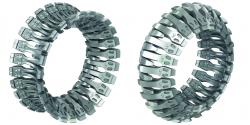Contact solution of the future
17 Dec,2018
Based on the two-component principle. This contact element is of particular interest to manufacturers of equipment and systems in the area of energy supply and distribution.

The new ML-CUX is the result of a consistent process of further development of the two-component Multilam for demanding, high-power contact solutions. It can be used at various points in switchgears, transformers, circuit breakers, isolator switches, and feedthroughs. Its innovative design combines optimised electrical and mechanical properties. This allows both a high-rated current carrying capacity and constant low-contact resistance with minimal contact heating, even with constant high load and thousands of mating cycles.
Furthermore, the ML-CUX is able to withstand even extreme current peaks and has a short-circuit current carrying capacity of up to 4.4 kA/cm. Therefore, the ML-CUX is especially appropriate for applications in which two or more spring contact elements are used. This allows a more compact design with smaller dimensions, meaning lower material costs for the manufacturer without the need to accept performance compromises. In addition, the special design allows simple manual insertion of Multilam into a straight, cost-effective, low-depth slot, even with larger contact diameters. A further crucial advantage of the new Multilam is its high tolerance compensation: a large working area makes the ML-CUX highly flexible and simplifies the compensation of angular and axial offsets. That gives the manufacturer more freedom to design a great variety of contact solutions and allows simpler, cost-effective production.
The advantage for plant operators is clear to Oliver Semling, Stäubli Electrical Connectors: “Our new Multilam flexo line is setting a new standard – it is the result of an evolutionary process that benefits from decades of experience. Considered in its entirety, the newest Multilam generation combines all crucial electrical and mechanical characteristics, but, above all, essential economic features too, in a way that reduces the overall operating costs of systems for customers. Material savings, compact design, maximum efficiency, durability and flexibility in a way that has not existed before for spring contact elements."
